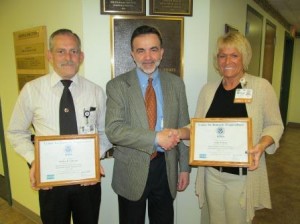
CLEARFIELD – Clearfield Hospital employees Brad Anderson, facilities director, and Cindy Reed, support services director, recently completed training offered by the Center for Domestic Preparedness in Anniston, Ala.
The CDP is operated by the U.S. Department of Homeland Security’s Federal Emergency Management Agency (FEMA) and is the only federally-chartered Weapons of Mass Destruction training facility in the nation.
The CDP develops and administers advanced training for emergency response providers, emergency managers and government officials. The CDP offers more than 50 training courses focusing on incident management, mass casualty response and emergency response to a catastrophic natural disaster or terrorist act. Training is federally funded at no cost to state, local and tribal emergency response professionals or their agency.
Resident training at the CDP includes healthcare and public health courses at the Noble Training Facility, the nation’s only hospital dedicated to training healthcare professionals in disaster preparedness and response.
A number of resident training courses culminate at the CDP’s Chemical, Ordinance, Biological and Radiological Training Facility (COBRA). The COBRA is the nation’s only facility featuring civilian training exercises in a true toxic environment using chemical agents. The advanced hands-on training enables responders to effectively prevent, respond to and recover from real-world incidents involving acts of terrorism and other hazardous materials.
During their week-long stay, Anderson and Reed received training on hospital emergency response for mass casualty incidents and participated in a mass casualty drill. The pair was also certified as emergency response trainers.
Anderson and Reed said the education they received through the CDP was the best hands-on training they have ever experienced.
“The biggest challenge we face as responders is to keep people engaged and to work as one large team. We all have a common goal and cannot realize that goal without each other’s expertise and support. The CDP educators encourage that to happen and are having an impact on responders’ readiness to adapt, overcome and survive as a team,” Anderson said.
Reed added, “The top-notch instruction we received has enabled us to become better hospital emergency response trainers. It has also enhanced the capabilities of our hospital emergency preparedness plan for the benefit of the community.”
Information about the CDP training programs can be found at http://cdp.dhs.gov.


